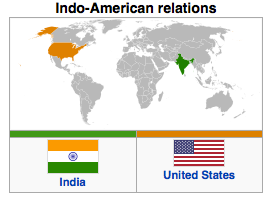India In Obama’s New Asia Pivot – Analysis
By Observer Research Foundation
By MK Venu
President Barack Obama’s second term is likely to put the US on a somewhat different ideological path, relative to the 20th century American capitalism one is so familiar with. If Obama’s mandate is any guide, America is about to move to a softer, more socialised capitalist framework in which the people’s welfare will be at the centre of policymaking. In a sense, America may be heading the European way in terms of pursuing social market policy, like Germany has done over the past many decades.

One could intuitively sense this new element in Obama’s vision from the nature of the political debate, which was highly polarised this time round. Mitt Romney had asserted he would roll back Obamacare if he came to power. And this mandatory universal healthcare programme was at the very centre of the new social market policy promised by Obama.
Obama’s victory, which turned out to be bigger than most people had anticipated, will further encourage Obama to reorient American capitalism and make it more socially oriented.
The first test for this subtle policy shift will be how Obama manages the looming fiscal cliff, which would require great political acumen. Some of the tax cuts carried forward from the Bush era and higher social sector expenditure will, by law, have to end in a couple of months from now. Analysts say this will, at once, result in a withdrawal of fiscal stimulus of about $570 billion, which is roughly 4% of US GDP. Theoretically, a fiscal contraction of this magnitude could send the US and global economy into a tailspin. The US GDP could shrink by over 3%, ushering in a full blown recession.
Obama will of course not let this happen. He would negotiate with the Republicans who control the US House of Representatives to softland the withdrawal of the fiscal stimulus. The Republicans will again insist that Obama must focus more on expenditure reductions rather than withdraw tax cuts. Obama would prefer to do away with some part of the ongoing $570 billion stimulus by taxing the relatively rich as he has promised in his election manifesto. Obama’s preference will be to increase taxes on the rich rather than reduce ongoing social security programmes for the poor.
It will be interesting to see how he deals with the hardcore elements in the Republican camp, fresh from a big victory at the polls. If he cannot assert himself now, after such a decisive win, he won’t be able to do so later. There is also talk that Obama will hit the road and directly communicate with the people, over the heads of the opposition in the Senate and House, to implement his new big ideas for America.
In his first tenure, Obama seemed to have a definitive vision, but he was possibly a bit tentative about implementing it. He spent some time feeling the ground. America also has a strong bureaucracy-the system-which has a mind of its own. The system often prevents the President from taking the risk of implementing an entirely new vision for America’s engagement with the rest of the world. The bureaucracy likes the well-charted path and prefers change, but ever so gradually. Obama may have given in to the bureaucracy in his first term.
But he will probably take more risks in his second term and break new ground. India is very well placed to be part of Obama’s new vision. While focusing primarily on reviving the domestic economy, Obama may experiment with a new set of ideas for America’s global engagement. India is the most important component of the Obama administration’s new trade and security policy for Asia-Pacific, described as the US’s evolving “Asia Pivot”. This is partly aimed at bringing China into a more rules-based, cooperative trade and security framework.
In pursuance of the new Asia Pivot strategy, India may receive many pleasant surprises from President Obama in the first half of 2013. In recent times, the bureaucracy on both sides have not been able to take forward the strategic partnership between India and US forward in a manner that was envisaged after the signing of the nuclear deal.
Partly old rules and government guidelines prevented the two sides from a deeper cooperation in defence, technology and other critical trade related matters. The promise of a Manmohan Singh-Obama mega knowledge partnership initiative, announced during the US President’s 2010 visit, never really got fleshed out in any substantive way.
But things could change now. Recently, some members of Parliament were told by key advisors of Obama that if the President got a second term, the US would move very fast in changing their bureaucractic and legislative rules to truly upgrade India to the status of a strategic partner, as is accorded to some of the western allies like the United Kingdom. Of course, this will not be a one-way street. Once the US effectively upgrades India as its strategic working partner, India will have to reciprocate in terms of keeping its own broad commitments on tying the remaining loose ends in bringing to fruition the civil nuclear cooperation. Similarly, for deeper engagement in defence trade, both sides will have to do away with the rigid rules of yesteryears made in the Cold War context.
The time may also be just ripe for India and US to sign a comprehensive free trade agreement encompassing goods, services, investment, etc. If India can sign this with Japan, why not with one of its largest trading partner? Recently, in a panel discussion on India-US relations, I asked the former US ambassador to India Timothy Roemer, a close advisor of Obama’s, to outline a few new ideas which the two sides could jointly pursue. Roemer cited a comprehensive Free Trade Agreement between the two countries as one big idea whose time had come.
This article appeared in The Financial Express and reprinted with permission.
